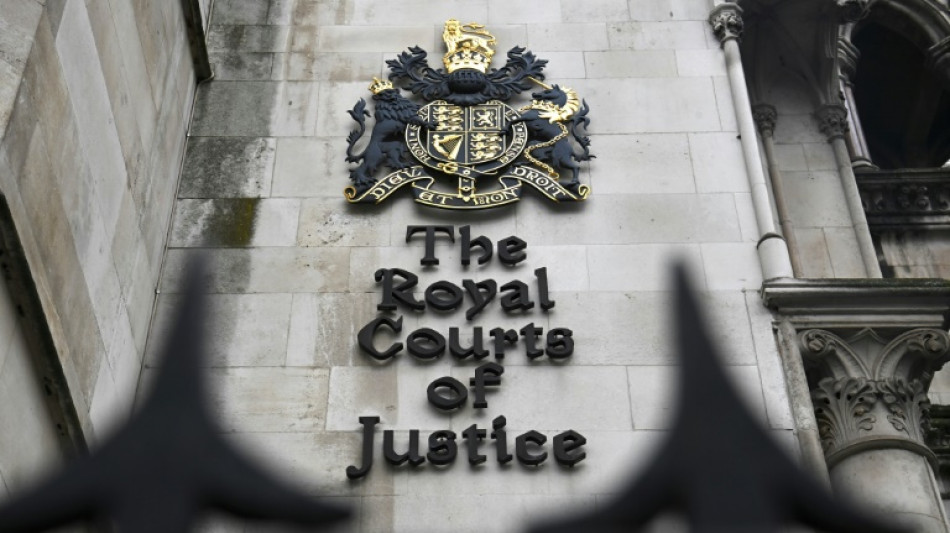
-
 UN Security Council votes to extend DR Congo mission by one year
UN Security Council votes to extend DR Congo mission by one year
-
Family of Angels pitcher, club settle case over 2019 death

-
 US university killer's mystery motive sought after suicide
US university killer's mystery motive sought after suicide
-
Rubio says won't force deal on Ukraine as Europeans join Miami talks

-
 Burkinabe teen behind viral French 'coup' video has no regrets
Burkinabe teen behind viral French 'coup' video has no regrets
-
Brazil court rejects new Bolsonaro appeal against coup conviction

-
 Three-time Grand Slam winner Wawrinka to retire in 2026
Three-time Grand Slam winner Wawrinka to retire in 2026
-
Man Utd can fight for Premier League title in next few years: Amorim

-
 Pandya blitz powers India to T20 series win over South Africa
Pandya blitz powers India to T20 series win over South Africa
-
Misinformation complicated Brown University shooting probe: police

-
 IMF approves $206 mn aid to Sri Lanka after Cyclone Ditwah
IMF approves $206 mn aid to Sri Lanka after Cyclone Ditwah
-
US halts green card lottery after MIT professor, Brown University killings

-
 Stocks advance as markets cheer weak inflation
Stocks advance as markets cheer weak inflation
-
Emery says rising expectations driving red-hot Villa

-
 Three killed in Taipei metro attacks, suspect dead
Three killed in Taipei metro attacks, suspect dead
-
Seven Colombian soldiers killed in guerrilla attack: army

-
 Amorim takes aim at Man Utd youth stars over 'entitlement'
Amorim takes aim at Man Utd youth stars over 'entitlement'
-
Mercosur meets in Brazil, EU eyes January 12 trade deal

-
 US Fed official says no urgency to cut rates, flags distorted data
US Fed official says no urgency to cut rates, flags distorted data
-
Rome to charge visitors for access to Trevi Fountain

-
 Spurs 'not a quick fix' for under-fire Frank
Spurs 'not a quick fix' for under-fire Frank
-
Poland president accuses Ukraine of not appreciating war support

-
 Stocks advance with focus on central banks, tech
Stocks advance with focus on central banks, tech
-
Amorim unfazed by 'Free Mainoo' T-shirt ahead of Villa clash

-
 PSG penalty hero Safonov ended Intercontinental win with broken hand
PSG penalty hero Safonov ended Intercontinental win with broken hand
-
French court rejects Shein suspension

-
 'It's so much fun,' says Vonn as she milks her comeback
'It's so much fun,' says Vonn as she milks her comeback
-
Moscow intent on pressing on in Ukraine: Putin

-
 UN declares famine over in Gaza, says 'situation remains critical'
UN declares famine over in Gaza, says 'situation remains critical'
-
Guardiola 'excited' by Man City future, not pondering exit

-
 Zabystran upsets Odermatt to claim first World Cup win in Val Gardena super-G
Zabystran upsets Odermatt to claim first World Cup win in Val Gardena super-G
-
Czechs name veteran coach Koubek for World Cup play-offs

-
 PSG penalty hero Safonov out until next year with broken hand
PSG penalty hero Safonov out until next year with broken hand
-
Putin says ball in court of Russia's opponents in Ukraine talks

-
 Czech Zabystran upsets Odermatt to claim Val Gardena super-G
Czech Zabystran upsets Odermatt to claim Val Gardena super-G
-
NGOs fear 'catastrophic impact' of new Israel registration rules

-
 US suspends green card lottery after MIT professor, Brown University killings
US suspends green card lottery after MIT professor, Brown University killings
-
Stocks mixed with focus on central banks, tech

-
 Arsenal in the 'right place' as Arteta marks six years at club
Arsenal in the 'right place' as Arteta marks six years at club
-
Sudan's El-Fasher under the RSF, destroyed and 'full of bodies'

-
 From farms to court, climate-hit communities take on big polluters
From farms to court, climate-hit communities take on big polluters
-
Liverpool have 'moved on' from Salah furore, says upbeat Slot

-
 Norway crown princess likely to undergo lung transplant
Norway crown princess likely to undergo lung transplant
-
Iraq negotiates new coalition under US pressure

-
 France's budget hits snag in setback for embattled PM
France's budget hits snag in setback for embattled PM
-
Putin hails Ukraine gains, threatens more, in annual press conference

-
 US suspends green card lottery after Brown, MIT professor shootings
US suspends green card lottery after Brown, MIT professor shootings
-
Chelsea's Maresca says Man City link '100 percent' speculation

-
 Dominant Head moves into Bradman territory with fourth Adelaide ton
Dominant Head moves into Bradman territory with fourth Adelaide ton
-
Arsenal battle to stay top of Christmas charts


Unhappy spouses celebrate as England adopts 'no-fault divorce'
No more faked evidence or years-long waits -- from Wednesday, unhappy spouses in England and Wales can end their marriages without blaming each other, in the biggest reform of divorce law for half a century.
The onset of "no-fault" divorces means one spouse no longer needs to prove the other guilty of adultery, "unreasonable behaviour" or desertion.
If such grounds did not exist, the couple had to live apart for two years before a divorce could be granted -- or five years if one partner objected to the proceedings.
The change brings England and Wales into line with Scotland, which has its own legal system, and with other countries including the United States, Australia and Germany.
While experts expect a rush of divorces by couples who were waiting for the legal reform, they predict it could also ironically increase rates of marriage, by promising an easier way out if the relationship sours.
The case of Tini Owens galvanised a campaign for the change after she lost a Supreme Court fight in 2018, having failed to persuade the judges that her 40-year marriage should end.
Her husband had contested her claims of unreasonable behaviour, and the judges ruled that being trapped in an unhappy marriage was not in itself grounds for divorce.
"No-one should have to remain in a loveless marriage or endure a long, drawn-out and expensive court battle to end it," Owens said.
"This change in the law guards against that happening and I welcome it," she added.
The reform does not herald US-style "quickie divorces" -- there is a minimum wait of 20 weeks between a spouse first initiating proceedings and then applying for a legal order.
They must then wait another six weeks before the divorce can be granted.
But it does overhaul the current system, in place for decades, under which some spouses would resort to private detectives to find evidence of fault, or the couple would agree simply to concoct the evidence.
Vicky admitted that she and her first husband "had to make up scenarios and situations that we felt were going to be accepted" by the court after they had agreed to an amicable divorce.
Her second marriage was to a "very manipulative" and "violent" man who refused to engage with divorce proceedings, forcing her to wait for five years of separation.
"And I could have been out of that relationship a lot quicker and a lot sooner than I was," Vicky, giving only her first name, told BBC radio.
Some lawyers welcomed the end of an adversarial divorce culture, while stressing that legal advice remained essential for resolving financial and child custody issues.
A survey commissioned by the law firm Slater and Gordon pointed to an unintended consequence -- 32 percent of cohabiting respondents said they were more likely to get married now that the divorce process was simpler.
O.Krause--BTB

